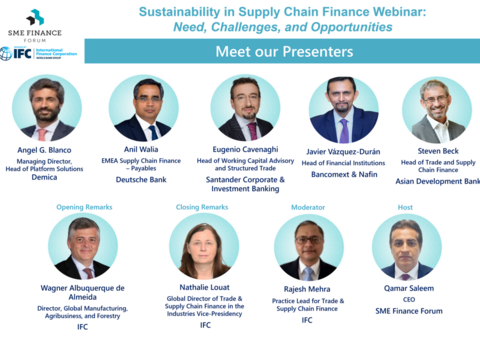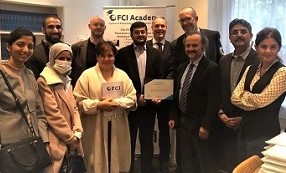Blog
Sustainability in Supply Chain Finance – Need, Challenges and Opportunities

Summary of the webinar discussion “Sustainability in Supply Chain Finance – Need, Challenges and Opportunities.”
October 25, 8 AM – 9:30 AM EDT
Panelists:
- Host: Qamar Saleem, CEO of the SME Finance Forum;
- Moderator: Rajesh Mehra, Practice Lead for Trade & Supply Chain Finance, Financial Institutions Group covering the Asia-Pacific region at IFC;
- Opening remarks: Wagner Albuquerque de Almeida, Director, Global Manufacturing, Agribusiness, and Forestry at IFC;
- Speaker: Steven Beck, Head of Trade and Supply Chain Finance at ADB;
- Speaker: Dr. Eugenio Cavenaghi, European Head of Working Capital Advisory and Structured Trade at Grupo Santander;
- Speaker: Anil K. Walia, Supply Chain Finance Payables – EMEA at Deutsche Bank AG;
- Speaker: Ángel G. Blanco, Managing Director, Head of Platform Solutions at Demica;
- Speaker: Javier Vázquez-Durán, Head of Financial Institutions, Bancomext & Nafin Mexico;
- Closing remarks: Nathalie Louat - Global Director, Trade and Supply Chain Finance at IFC.
Session description and objectives:
Supply chain finance (SCF) is important for small and medium-sized enterprises (SMEs) for several reasons, such as improving cash flow, expanding access to capital, and strengthening supplier relationships. Key stakeholders, including large companies, financial institutions, and technology platforms, can play an important role in designing solutions to support SME clients in creating tools to boost the sustainable transition throughout the supply chain, leveraging on financing, capacity building, and sustainability initiatives. The sustainability-linked SCF applies a pricing benefit to suppliers who meet predefined sustainability criteria (e.g., GHG emissions and/or other ESG KPIs), turning SCF into a tool for buyers to incentivize the suppliers’ transition to sustainability.
During this session, the speakers examined the following topics:
-
The need for sustainability in SCF:
- Benefits to buyers and suppliers, especially SMEs;
- Opportunity for financial institutions to offer differentiated offerings to their large corporate clients;
- Challenges and opportunities in transforming supply chains to sustainable supply chains;
- Integrating ESG and green finance with SCF to achieve social, climate, and environment-friendly benefits.
The panelists shared their views on global trends in sustainable supply chains, best practices, and success stories.
Opening Remarks — Wagner Albuquerque de Almeida, Director, Global Manufacturing, Agribusiness, and Forestry, IFC:
The World Bank Group estimates that trillions of dollars are trapped in global value chains. SCF solutions can help improve access to capital for SMEs in emerging markets, where SMEs are more likely to generate jobs, and at a faster pace, when they have access to finance.
Sustainable supply chains are especially important for SMEs. Some of the specific benefits of sustainable supply chains for SMEs include:
- Access to finance: Sustainable supply chains can help SMEs attract investors and lenders looking to support sustainable businesses. For example, IFC's Global Trade Supply Chain Finance (GTSF) Program provides financing to SMEs in emerging markets involved in sustainable supply chains.
- Reduced costs: Sustainable practices can help SMEs reduce operating costs, such as their energy and waste costs. For example, an SME that invests in energy-efficient equipment can save money on its energy bills.
- Increased sales: Consumers are increasingly demanding sustainable products. SMEs that can demonstrate that their products are produced sustainably are more likely to attract customers and increase sales.
- Improved reputation: SMEs seen as being sustainable are more likely to attract and retain employees and customers.
SMEs should invest in sustainable practices and work with their suppliers to create sustainable supply chains. Sustainable supply chains are essential for long-term financial success, especially for SMEs.
IFC’s GTSF Program has been helping hundreds of emerging markets’ suppliers of major global corporates to obtain access to highly affordable short-term financing. GTSF purchases and discounts invoices accepted for payment by pre-approved buyers. By leveraging the credit rating and commercial strength of buyers, GTSF enables access to low-cost financing solutions for suppliers, many located in IDA17 countries.
Further, GTSF incentivizes improved environmental and social performance of these suppliers through a sustainability-linked pricing feature that has been implemented in several GTSF facilities, including programs for suppliers of Nike, Puma, Levi’s McCormick, and Barry Callebaut. In such facilities GTSF’s interest rates are linked to the supplier’s environmental and/or social performance or suppliers’ progress in the implementation of low-carbon investments, effectively giving suppliers a financial incentive to improve.
In FY23, GTSF’s total disbursements were US$2.14 billion and 60% of these funds went into facilities that utilize sustainability-linked pricing.
IFC advisory compliments GTSF by helping corporates to improve E&S standards in their supply chains through impactful global programs, such as Partnership for Cleaner Textile (PACT) (climate/environment), Gender Equality and Returns (GEAR) (gender), and IFC’s partnership with ILO on Better Work (labor and working conditions).
These programs work directly with suppliers helping them to improve their environmental and social practices. For instance, since 2007, Better Work has actively partnered with 47 global buyers (leading apparel brands and retailers) who represent the vast majority of the global textile and apparel market, in close to 2,000 apparel factories across 12 countries, to improve working conditions on the ground.
Opening question to all panelists: Sustainability is becoming increasingly prominent in SCF at the global sectoral and corporate levels, mainly due to the evolving expectations around sustainability-related concerns from our investors, customers, and regulators. You are also observing this trend among your clients and stakeholders. What does sustainability in SCF mean to you? Could you elaborate on how you are incorporating sustainability in your SCF offerings and addressing challenges?
Steven Beck, Head of Trade and Supply Chain Finance, Asian Development Bank (ADB):
Sustainability in SCF is of utmost importance due to its significant impact on global carbon footprints. There is a growing recognition of sustainability's importance, especially after the intensified focus on supply chains post-COVID. There is a correlation between sustainability and addressing gaps in SCF, particularly in serving SMEs, which underscores the need to close these gaps. ADB is working on sustainability by providing guarantees and loans through banks, forming partnerships, and scaling its SCF program.
Eugenio Cavenaghi, European Head of Working Capital Advisory and Structured Trade, Santander Corporate & Investment Banking:
From the commercial bank perspective, sustainability is becoming increasingly important in SCF. Santander has a long history in SCF and has seen a significant rise in demand for sustainability-linked programs in recent years. SCF, through technology and financial monitoring, can help companies better manage and improve the environmental impact of their value chain, particularly scope 3 emissions. Measuring and incentivizing key performance indicators (KPIs) related to sustainability is the right way to go, and SCF plays a role in achieving this goal.
Anil Walia, EMEA Supply Chain Finance – Payables, Deutsche Bank:
Improving sustainability in the supply chains is increasingly important for corporates. Around eighty percent of a manufacturing company’s CO2 footprint is in the external value chain. And a very substantial part of this is in the upstream value chain – purchasing. Sustainability-linked SCF programs may support a corporation’s strategy to improve sustainability in its procurement activity. This improvement will ultimately be reflected in their ESG Ratings. Sustainability is not just about reducing CO2 emissions but also about the corporation’s social responsibility, which has become a major strategic element for companies. The younger generation of clients are making decisions based on the ESG (Environmental, Social, and Governance) behavior of brands, and companies are recognizing this shift in consumer behavior. Overall, in addition to the competitive business environment and the need to address global challenges, sustainability has become a factor affecting business strategy, not only among financial institutions but also among corporations.
Angel G. Blanco, Managing Director, Head of Platform Solutions, Demica:
Sustainability in SCF is essential. Still, it can present challenges for SMEs. While sustainability is a necessary aspect of modern business, it can be a burdensome requirement for SMEs, as they may need to make investments to meet sustainability criteria while struggling to maintain their financial stability. The industry must support sustainability in a way that simplifies the process for SMEs.
Furthermore, the economic viability of SMEs accessing funding in SCF needs to be improved, as the cost of the onboarding process and operations can sometimes outweigh the benefits for financial institutions. Technology can play a crucial role in addressing these challenges by facilitating and streamlining the requirements for both sustainability and KYC (Know Your Customer) processes. In essence, technology can make it simpler, faster, and more cost-effective for SMEs to access funding in SCF.
Javier Vázquez-Durán, Head of Financial Institutions, Bancomext & NAFIN:
Bancomext and NAFIN, Mexico's development banks, are playing a key role in helping the country meet its sustainability commitments. They are doing this by:
- Participating in the creation of a sustainability taxonomy for the financial system.
- Issuing sustainable bonds, including both green and social bonds.
- Developing a sustainable framework within the banks that includes sustainability, gender, environmental and social policies.
- Implementing an environmental and social risk management system for direct and indirect lending.
Bancomext and NAFIN also work to help financial institutions, particularly non-bank financial institutions, comply with ESG requirements. They do this by offering credit products and programs to help these institutions transition to the implementation of the best green or social practices. ESG is not just another requirement for accessing funding, but a best practice that is essential for addressing climate change. They are committed to working with financial institutions and SMEs to implement ESG criteria in their day-to-day transactions.
Overall, Bancomext and NAFIN are leading the promotion of sustainable supply chains in Mexico. Their efforts are helping to make the Mexican financial system more sustainable and to support the country's transition to a green economy.
Summary of the panel discussion
Steven, specifically from an Asian perspective how much demand financial institutions are seeing for sustainability solutions. I have a feeling that sectors linked to trade with Western countries are more advanced in this regard, while little progress has been made in other sectors. Can you also shed some light on the real challenges faced by financial institutions in Asia in this regard?
Steven Beck, from ADB, believes there is a growing demand for sustainable SCF in Asia. This is being driven by several factors, including i) a desire from clients to do the right thing; ii) consumers wanting to consume responsibly; iii) the need for SMEs to demonstrate sustainability to access finance and supply chains; and iv) upcoming regulations requiring companies to report on their scope 1, 2, and 3 emissions.
Beck said that it is essential for SMEs to be prepared for the rollout of the new reporting requirements. He is working with IFRS to translate the climate portion of the upcoming reporting requirements into a supply chain context and with GS1 to develop a system for tracking the carbon footprint of goods at each phase of the supply chain.
Beck also said that we must consider going into deep-tier SCF to include more SMEs in the sustainable SCF ecosystem. This presents some tech and legal challenges, but the potential benefits are huge.
Overall, Beck is optimistic about the future of sustainable SCF in Asia. He believes that the demand is there and that the ADB is working to support the development of the market.
Beck provided a few additional insights:
- Women-led SMEs are particularly underserved in the sustainable SCF market. The ADB and other multilateral institutions are running programs to address this gap.
- SMEs need to be prepared to report on their scope 1, 2, and 3 emissions soon. This will be a requirement for accessing finance and supply chains.
- Deep-tier SCF has the potential to include more SMEs in the sustainable SCF ecosystem and to improve transparency. The ADB is working to address the tech and legal challenges associated with deep-tier SCF.
Eugenio, based on your experience working with deep-tier supply chain financing of large MNCs, what pricing incentives or strategies have been successful in building a sustainable supply chain for these clients? Can you also share some examples of success cases?
Eugenio Cavenaghi shared that Santander has implemented six sustainability-linked programs in Europe this year, each with a slightly different incentivization mechanism.
There are three main types of incentivization schemes that Santander has used:
- Gating items: Suppliers must meet a certain sustainability criterion to participate in the program. For example, in the program with ENDESA, suppliers must have an ISO quality certification.
- Scoring: Suppliers are scored according to a sustainability rating by a neutral external agency. Suppliers in the top tier receive a rebate on their discounting price, while suppliers in the bottom tier pay a higher price. This is the approach that Santander has used with its client Henkel.
- Ad hoc scoring: Suppliers are scored on one or two sustainability metrics relevant to the buyer's corporate social responsibility agenda. For example, in the program with Tesco, suppliers were scored on their greenhouse gas emissions.
Cavenaghi said that the economic incentive alone is insufficient to justify suppliers' investment in improving their sustainability performance. However, the ranking of suppliers based on their sustainability score is what makes the difference. Suppliers strive to be in the top tier, and the price adjustment, while symbolic, makes it official. This is what is driving suppliers to improve their sustainability performance over time.
Anil, I would like to ask you a follow-up question regarding the selection and standardization of metrics used to measure sustainability performance. I'm curious about the challenges this process faces, considering that certification and audit procedures differ across various markets and industries. How are these challenges being addressed?
Anil Walia from Deutsche Bank responded that there are no market standards for metrics in sustainable SCF because the field is still very new.
There are several ESG rating providers, but their rating methodologies differ. Deutsche Bank created a mapping table to compare suppliers rated by different agencies for a sustainability-linked SCF (SSCF) program.
Each financial institution conducts its due diligence on the ESG rating providers, but it is not their place to set the standards for metrics in SSCF. They are responding to the needs of their corporate clients as buyers are driving the push toward sustainability in the supply chain. Standardization is a slow process borne out of practice.
The economic incentive provided by a SCF program is often not enough to cover the cost of a supplier making significant sustainability-linked improvements. This suggests that going ahead, buyers may need to consider providing additional support to their suppliers to achieve their sustainability goals.
Angel, there are various SCF platforms and digital solutions now available for supply chain management and financing. Can you provide some examples of how technology is facilitating the incorporation of sustainability within SCF and decreasing the costs associated with compliance?
Angel Blanco of Demica noted that data are essential for sustainable SCF, as they allow financial institutions to assess the sustainability performance of suppliers and provide them with incentives to improve. However, obtaining reliable and consistent data from SMEs can be a challenge.
Technology can play a role in facilitating the data collection process by automating the processing of invoices and other documentation and by storing and managing data. Technology can also be used to set up different pricing levels for suppliers based on their sustainability performance.
If financial institutions do not have access to reliable data on the sustainability performance of their suppliers, it will be difficult for them to manage the sustainability objectives of their sustainable SCF programs.
Blanco gave some specific examples of how financial institutions can use technology to facilitate the data collection process:
- Digital onboarding: Financial institutions can use technology to streamline the onboarding process for SMEs, making it easier for them to provide the data that is needed to participate in a sustainable SCF program.
- Electronic signatures: Financial institutions can use electronic signatures to make it easier for SMEs to sign contracts and other documents.
- APIs: Financial institutions can use APIs to connect with their suppliers' systems and automatically collect data on their sustainability performance.
- Data storage and management: Financial institutions can use technology to store and manage the data that they collect on their suppliers' sustainability performance. These data can then be used to assess the suppliers' performance and to make decisions about pricing and other incentives.
By using technology to facilitate the data collection process, financial institutions can make it easier for SMEs to participate in sustainable SCF programs and to improve their sustainability performance. This will help financial institutions to manage the sustainability objectives of their programs and to create a more sustainable financial system.
Javier, can you share your DFI's experience in building the capacity of SMEs to reduce emissions and engage them in achieving sustainability goals?
Javier Vázquez-Durán shared that Bancomext & Nafin are providing SMEs with access to affordable financing to help them purchase new, energy-efficient equipment and reduce their carbon emissions. The institution's programs are designed to financially benefit SMEs, as the savings generated by the new equipment are sufficient to repay the loan. This approach is helping to build the capacity of SMEs to invest in sustainability and reduce their environmental impact. The institution's expansion of these programs to include financing for energy efficiency projects is a positive step that will help to further support SMEs in their sustainability efforts.
Closing Remarks — Nathalie Louat - Global Director, Trade and Supply Chain Finance at IFC.
IFC estimates that more than 40% of formal SMEs in developing countries have an unmet financing need. On average, receivables account for 40% of the total assets of SMEs, and deferred credit payment terms are usually the largest cause of SMEs’ financial challenges. IFC believes that improving access to finance for SMEs in global and local supply chains requires effective collaboration between buyers, their SME suppliers, and financial institutions.
Therefore, in 2022 IFC launched the Global Supply Chain Finance Program (GSCF). Through this program, IFC supports banks that are planning to expand their SCF operations in emerging markets. Under the program, IFC will partner with global, regional, or local financial institution clients to either expand their existing SCF practices or help them launch the SCF product, depending on their specific needs. IFC has advisory teams in all regions that are active in providing capacity-building and training programs for local financial institutions in order for them to kick-start SCF operations.
Under this new program, IFC will share the underlying transaction risks on a pool of buyers serviced by each financial institution. IFC will take the risk of both investment and non-investment grade buyers. This program’s aim is for our partners to increase the headroom of those buyers by utilizing IFC’s guarantee or funded risk participation which should ultimately improve access to finance for emerging markets suppliers.
Sustainability has always been IFC’s top priority in IFC’s Trade and Supply Chain Finance business line. IFC is committed to working with financial institution partners to promote greener SCF and advance the sustainability agenda. IFC is delighted to share its climate and sustainability-related appraisal knowledge with clients including labor, resource efficiency, and biodiversity issues, and is active in providing climate and sustainability training for financial institution clients in emerging markets. The most recent one took place in Singapore last month.
To promote greener and more sustainable trade and supply chains, IFC is currently leading the effort to come up with the definitions, in cooperation with other MDBs. IFC hopes to finalize the guidelines next month and plans to publish the Common Principles during COP28 in Dubai in December.
Though the guidelines are focused on eligible goods, it has information about various sustainability certifications IFC recommends. If you are interested in learning more about these Common Principles, please contact IFC or please try to join IFC’s training programs for financial institutions.
Last but not least, SCF is a priority for IFC’s Trade and Supply Chain Finance Department due to its ability to reach out to SMEs in emerging markets. If you are interested in this product, please reach out to IFC.












